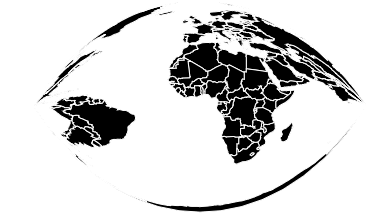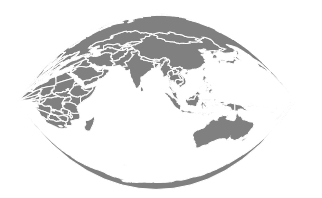d3.js中的geoCraig()函數用於從給定的geojson數據繪製Craig反向投影。
用法:
d3.geoCraig()
參數:此方法不接受任何參數。
返回值:此方法返回Craig投影。
範例1:下麵的示例繪製中心為(0,0)且旋轉為0的世界的Craig投影。
HTML
<!DOCTYPE html>
<html>
<head>
<script src="https://d3js.org/d3.v4.js">
</script>
<script src=
"https://d3js.org/d3-geo-projection.v2.min.js">
</script>
</head>
<body>
<div style="width:700px; height:500px;">
<center>
<h3 style="color:black"></h3>
</center>
<svg width="600" height="450">
</svg>
</div>
<script>
var svg = d3.select("svg"),
width = +svg.attr("width"),
height = +svg.attr("height");
// Craig projection
// Center at (0,0) with 0 degree rotation
var gfg = d3.geoCraig()
.scale(width / 1.8 / Math.PI)
.rotate([0, 0])
.center([0, 0])
.translate([width / 2, height / 2]);
// Loading the json data
d3.json("https://raw.githubusercontent.com/" +
"janasayantan/datageojson/master/" +
"world.json",
function (data) {
// Drawing the map
svg.append("g")
.selectAll("path")
.data(data.features)
.enter().append("path")
.attr("fill", "Black")
.attr("d", d3.geoPath()
.projection(gfg)
)
.style("stroke", "#ffff")
});
</script>
</body>
</html>輸出:

範例2:下麵的示例繪製中心為(20,20)且相對y軸旋轉90度的世界的Craig投影。
HTML
<!DOCTYPE html>
<html>
<head>
<script src="https://d3js.org/d3.v4.js">
</script>
<script src=
"https://d3js.org/d3-geo-projection.v2.min.js">
</script>
</head>
<body>
<div style="width:700px; height:600px;">
<center>
<h3 style="color:black"></h3>
</center>
<svg width="500" height="450">
</svg>
</div>
<script>
var svg = d3.select("svg"),
width = +svg.attr("width"),
height = +svg.attr("height");
// Craig projection
// Center at (20, 20) and
// -90 degree rotation w.r.t y-axis
var gfg = d3.geoCraig()
.scale(width / 1.8 / Math.PI)
.rotate([-90, 0])
.center([20, 20])
.translate([width / 2, height / 2]);
// Loading the json data
d3.json("https://raw.githubusercontent.com/" +
"janasayantan/datageojson/master/" +
"world.json",
function (data) {
// Draw the map
svg.append("g")
.selectAll("path")
.data(data.features)
.enter().append("path")
.attr("fill", "grey")
.attr("d", d3.geoPath()
.projection(gfg)
)
.style("stroke", "#ffff")
});
</script>
</body>
</html>輸出:

相關用法
- PHP imagecreatetruecolor()用法及代碼示例
- p5.js year()用法及代碼示例
- d3.js d3.utcTuesdays()用法及代碼示例
- PHP ImagickDraw getTextAlignment()用法及代碼示例
- PHP Ds\Sequence last()用法及代碼示例
- PHP array_udiff_uassoc()用法及代碼示例
- PHP geoip_continent_code_by_name()用法及代碼示例
- d3.js d3.map.set()用法及代碼示例
- PHP GmagickPixel setcolor()用法及代碼示例
- PHP opendir()用法及代碼示例
- PHP cal_to_jd()用法及代碼示例
- d3.js d3.bisectLeft()用法及代碼示例
- PHP stream_get_transports()用法及代碼示例
- PHP Ds\Deque pop()用法及代碼示例
注:本文由純淨天空篩選整理自jana_sayantan大神的英文原創作品 D3.js geoCraig() Function。非經特殊聲明,原始代碼版權歸原作者所有,本譯文未經允許或授權,請勿轉載或複製。
